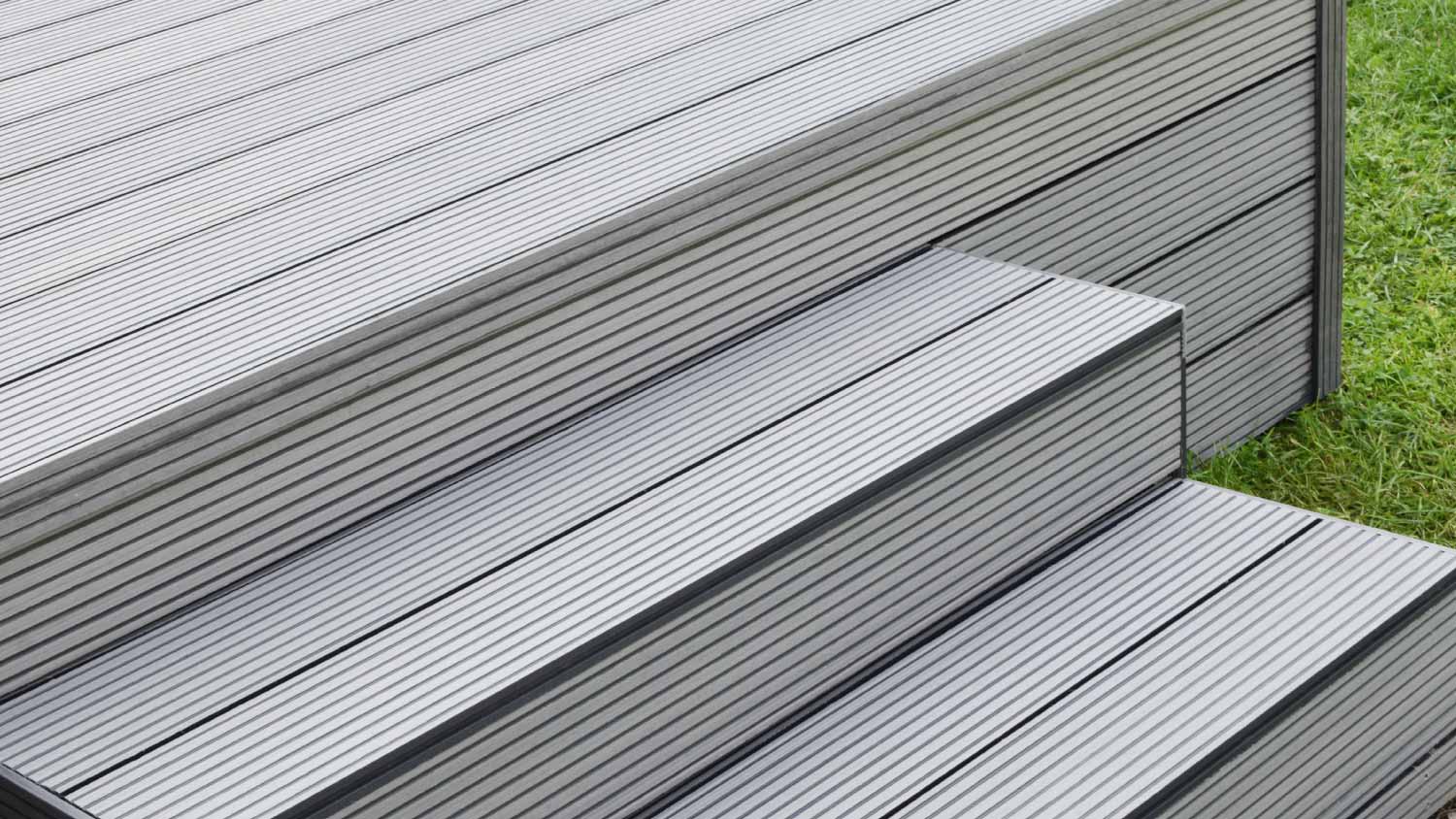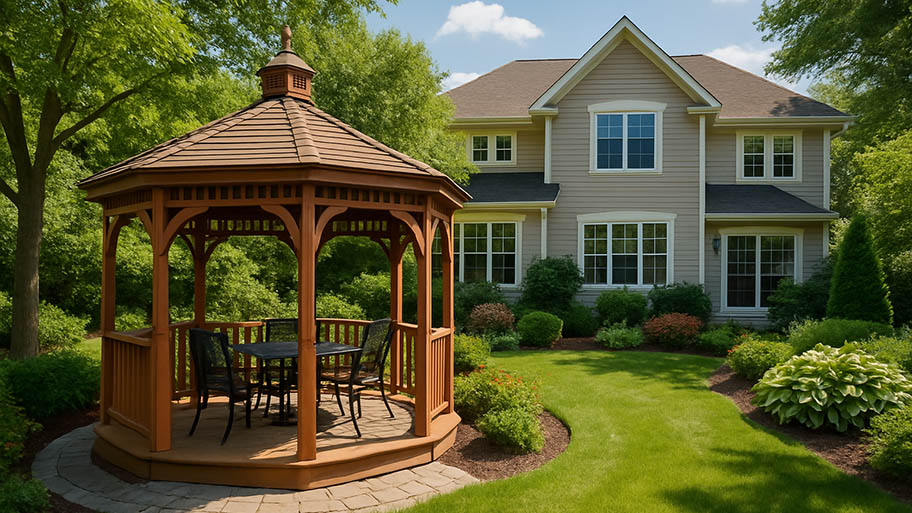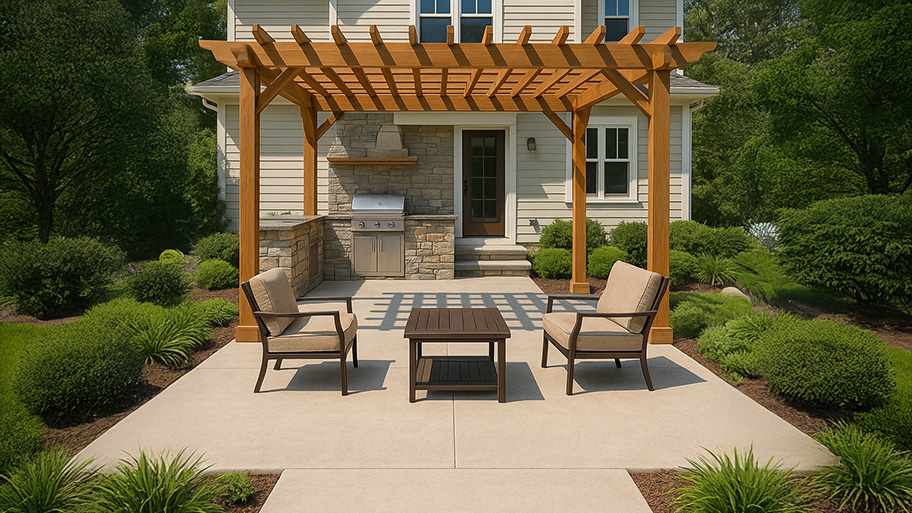
A deck skirt can improve the form and function of a deck. Find out what it could cost to install deck skirting in your backyard with this guide.
Get ready for an epic summer barbeque


Composite decking is a blend of natural and synthetic materials, including wood fiber, polymer, plastic, and chemical additives.
Composite is weather- and UV-resistant and lasts 30 to 50 years.
Wood is less expensive than composite upfront, but composite will save you money over time in maintenance costs.
Composite decking works for almost all projects and climates and offers customizations with different colors and thicknesses.
Have you ever considered composite decking for building the outdoor space of your dreams? Composite decking is made of natural and synthetic materials resembling wood, but composite lasts longer and requires less maintenance than wood. Learn all about composite decking, the cost, and whether it’s right for your project.
Composite decking is synthetic decking made of wood fiber, polymer, plastic, and chemical additives. Sometimes, it includes recycled materials.
Manufacturers create composite deck boards through either extrusion or compression molding. The synthetic and wood parts are blended thoroughly to produce a dense core material. The ratio of natural wood to synthetic ingredients depends on the brand you choose. Most brands offer either a 50-to-50 wood-to-synthetic ratio or 70-to-30 wood-to-synthetic ratio.
Composite decking lasts between 30 and 50 years and requires minimal maintenance. You’ll only need to deep clean your deck once a year and spot-clean spills. Some composite deck boards have an outer cap for extra protection from UV damage and the elements, increasing their longevity.
Composite decking is a great option for any deck size, shape, and height. Learn about more advantages and disadvantages of composite decking.
Resistant to UV damage and fading
Holds up in almost all weather conditions
Moisture resistant
Low maintenance
Easy to clean
Doesn’t require sanding, staining, or sealing
More durable and long-lasting than wood
Doesn’t warp, split, or crack like natural wood does
Saves money over time due to limited maintenance and repairs
Available in many styles and colors that resemble wood
Higher installation cost
Can look artificial
Challenging to replace or repair parts
Can experience mold if moisture builds up
Dark colors can feel hot in the sun
Composite decking ranges from basic designs to higher-quality options with more features. You can opt for a simple look or get more creative with colors and patterns. Most composite decking brands offer two to three tiers of decking products that range in price.
Trex decking, for instance, has three types of composite decking that vary in thickness, durability, and cost. Many brands also offer add-ons to enhance the functionality of your outdoor spaces, like pergolas, lattices, and deck drainage systems.
The most widely available composite decking brands include:
Deckorators
Fiberon
MoistureShield
TimberTech
Trex
WearDeck
Wolf Home Products

Composite decking prices range from $4 to $12 per square foot for materials only. It costs $25 to $54 per square foot for a pro to build a composite deck. As an example, building a 144-square-foot composite deck costs $5,700 on average.
Basic composite decking costs less than high-end, extra-weather-resistant composite decking. Certain designs and colors cost more, too, such as those that look more like authentic wood. If you’re looking to save on your composite deck, try opting for standard colors and fewer added features.
You can use composite decking for all types of decks: attached and detached decks, multi-tier decks, hot tub and pool decks, or side decks. You can also create custom composite decking, but you should hire a pro if you’re planning a deck with a unique shape.
Composite decking is a great choice for many homes, but it’s especially appealing for:
People who don’t have as much time for deck maintenance
People who prefer a more modern look over the classic look of natural wood
People willing to spend more money upfront to avoid long-term maintenance costs
People looking for a more durable deck material than wood

What's the difference between composite decking and normal decking?
Wood decking is made of cedar, treated lumber, or hardwoods like ipe, jatoba, and tigerwood. You can stain or paint a wood deck any color, making it easy to coordinate your deck with your home. Wood decking costs less upfront but requires more maintenance, including sanding, staining, and sealing every one to three years. Real wood is also more prone to moisture damage, rot, and discoloration.
Composite decking lasts longer and requires less maintenance than wood decking. While it has a higher upfront cost than wood, the lower long-term maintenance costs of composite make up for it over time. Additionally, composite resists the elements better, giving you a like-new deck for longer.
The best decking material for you depends on your budget, design preferences, and how much time you can devote to maintenance. Compare composite decking versus wood to see which is best for you.
| Composite | Wood |
|---|---|
| More expensive upfront | Less expensive upfront |
| May be more difficult to coordinate with home aesthetic | May be easier to coordinate with home aesthetic |
| Fewer maintenance requirements and costs | More maintenance requirements and costs |
| Lasts longer | Shorter life span |
| More resistant to the elements | More prone to moisture damage, rot, and discoloration |
A professional deck-building contractor costs $10 to $14 per square foot to build a composite deck. The larger and more complex your deck design, the more you’ll pay. For example, adding steps to your composite deck will cost you an additional $25 per square foot for labor alone.
Your labor costs will also increase if you must demolish an existing deck or level the land where your deck will be built. On top of the labor cost to build a deck, you’ll also need to factor in permit costs.
You can install composite decking yourself only if you have solid carpentry skills. You’ll need to cut, level, and secure the pieces, meaning you need the right tools, including a circular saw and power drill. If you don’t have a base for your deck, you must install deck footings and a solid frame. Sound like a lot of work? That’s because it is.
Hiring a local deck builder is your best bet. A pro can ensure your composite deck is level, stable, up to code, and lasts 30 to 50 years. It’s better to hire a pro right off the bat than to make a mistake that ends up costing you a lot more in the long run.
From average costs to expert advice, get all the answers you need to get your job done.

A deck skirt can improve the form and function of a deck. Find out what it could cost to install deck skirting in your backyard with this guide.

Learn the cost of a metal awning for your home. Discover the essentials of installation, materials, and labor, and explore ways to save on your project.

The average gazebo installation cost depends on the size and material. Keep reading to discover how much your gazebo may cost.

Wooden decks aren’t cheap, and they should be made—and maintained—to last. Learn why your deck is cracking and how you can keep it lasting for years.

Wondering who builds decks? Here’s who to hire and what you need to consider before starting a deck-building project.

Before you pour your concrete, you should know how thick a concrete patio should be. The ideal thickness varies, so use this guide to get it right.